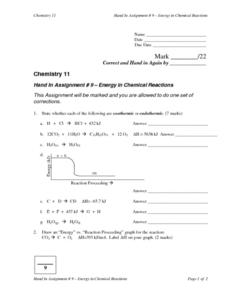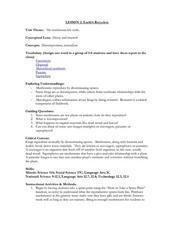Curated OER
Food Chains Are Not A Necklace!
Second graders examine how food chains interact with different plants and animals. They practice using new vocabulary. They also discover the role of pesticides in the environment.
Curated OER
Populations and Ecosystems
Sixth graders define terms prey, predator, and scavenger, describe predator-prey relationship, discuss effects of a lack of predators in an environment, and separate the role of the scavenger from that of the predator.
Curated OER
Spring of Life
Students explore Florida's springs using video segments. In this video lesson, students examine Florida's springs ecosystem, the animals that live there and the red tide that threatens the environment. The lesson includes researching...
Curated OER
Wetlands - Food Web Relationships
In this food web relationships instructional activity, students click on the links to learn about the food web relationships in the wetlands and answer short answer questions about it. Students complete 8 questions total.
Curated OER
Water Quality and Dissolved Oxygen
Students investigate the relationship between dissolved oxygen and organic materials and aquatic organisms. This is a 3-lesson series in which students explore dissolved oxygen and then design an experiment testing the effects of changes.
Curated OER
Ecology and The Endangered Species Act
Learners listen to a lecture about the basics of Ecology. They take a field trip in which they observe a specific organism and their characteristics.
Curated OER
Ecology and the Conservation of Natural Resources Lesson 2
Young scholars compare and contrast abiotic and biotic factors. They discuss how these factors effect ecosystems. They answer questions to complete the lesson.
Curated OER
My Biotic Creation
Eighth graders explore different ecosystems. In this ecosystem survival lesson conditions lesson students create their own fictional creature.
Curated OER
Brine Shrimp Anatomy
Third graders investigate the anatomy of the brine shrimp. They construct a model of the shrimp to demonstrate the anatomical parts of the shrimp. Students research the different factors that contribute to shrimp survival. Then they...
Curated OER
Energy in Chemical Reactions
For this chemical reaction worksheet, students determine if reactions are exothermic or endothermic. Students define enthalpy and calculate how much heat is released or absorbed during reactions. This worksheet has 1 matching, 1 fill in...
Curated OER
Extremophiles- Non-Fiction Reading Comprehension
In this extremophiles non-fiction reading worksheet, students read a two page selection that describes the organisms known as extremophiles. They answer 10 questions based on the selection which include true or false, short answer, and...
Curated OER
Heat 1
In this heat worksheet, learners determine the heat gained or lost when matter changes phases. Students review the energy flow through ecosystems by comparing trophic levels and food webs. This worksheet has 10 fill in the blank, 5 short...
Curated OER
Magical Images of the Estuary
Students investigate picture taking techniques while visiting an estuary. In this picture taking lesson, students examine the "Magical Images of the Estuary" handout. They think of and list important picture taking techniques before...
Curated OER
Let's Create an Ecosystem
Seventh graders discover how an ecosystem works by creating one in class. In this Earth science lesson, 7th graders study vocabulary terms associated with ecosystem and read environment handouts. Students create an observatory...
Curated OER
Chewin' in the Chesapeake
Students examine a web page on food webs and select a habitat to research. In this research lesson plan students identify the organisms found in the food web and present their findings to the class.
Curated OER
The Web Of Life - Overlapping Food Chains
Students perform an activity in which they discover what happens when food chains overlap in an ecosystem and discover the three components of a food web.
Curated OER
March Market
Students role play a living wetland food web. They trace the food web associated with the items in their lunch.
Curated OER
The Dead Zone: A Marine Horror Story
Students graph dissolved oxygen versus depth using data taken from NECOP Program. For this marine science lesson, students explain the causes of hypoxia. They recommend possible solutions to this problem.
Curated OER
Webbing the Food Chain
Students compose a visual representation of the food chain cycle using Inspiration educational software.
Curated OER
Water Quality and Temperature
Students are led through three activities to explore the effect of temperature fluctuations on the growth and survival of aquatic plants, clams, and shrimp eggs.
Curated OER
Ecological Citizen
Learners examine the interconnectedness of living and non-living things that constitute an ecosystem. They examine fallen trees,insects, living trees, leaves, food webs, and forests. They conduct various activities and write poems about...
Curated OER
Earth's Recyclers
Learners work together in groups to report on different topics related to decomposition. They answer questions and share their answers with the class. They discuss any topic that is unclear.
Curated OER
Dissolved Oxygen
Students discuss the relationships between dissolved oxygen in a stream, stream temperature, organic waste loads, and stream conditions by studying and using a model of dissolved oxygen in the stream.
























